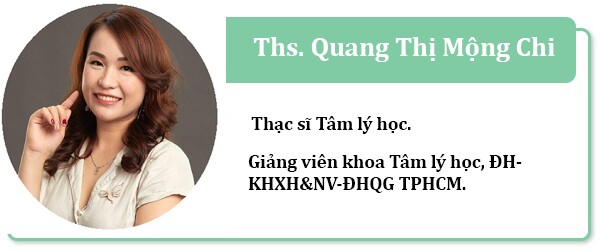Many parents feel ashamed and anxious about what others think when their children misbehave. This is seen as a way to protect the child’s image in the eyes of others.

Illustration photo.
At home, children can comfortably express their emotions without worrying about judgment from others. In contrast, when they are outside, children may feel more pressure and exhibit unusual behavior. However, parents need to realize that being “well-behaved” or “naughty” is not solely dependent on the context.
Asserting, “My child is well-behaved” when the child is misbehaving can reduce attention to the issues that need to be addressed. For a child to be truly “well-behaved” is not just about behavior but also about the bond between parents and children.
Therefore, parents should create a loving and understanding environment to nurture their children to become confident and responsible individuals in society.

Psychologist Quang Thi Mong Chi.

“My child is well-behaved at home!’ – a common phrase used by many parents when their child misbehaves. Why do parents tend to defend their children, even when they are clearly in the wrong?
This is a common phenomenon that can be explained from various psychological perspectives. First, it is important to understand that protecting one’s children is a very natural instinct for parents.
When hearing complaints or criticism about their child, many parents immediately feel that their child is being threatened, and thus arises the need to protect them. In some cases, denying the child’s mistake may not be intentional but rather a defensive reaction stemming from their emotions.
However, beneath this reaction lies a deeper factor: the parents’ self-image. Many parents unconsciously view their children’s behavior as a reflection of their own parenting skills. Therefore, admitting their child’s mistake also means indirectly acknowledging their own shortcomings in raising their child.
This can make them feel hurt, ashamed, or even a sense of failure. In addition, we cannot ignore the fact that children often exhibit very different behaviors at home and in school. Some children are well-behaved at home but display inappropriate behavior in society. This makes it difficult for parents to believe that their child can act inappropriately as reported by others, especially when they only witness the child’s “good” side.
Moreover, the pressure of societal expectations also contributes to parents’ tendency to defend their children. In the context of Asian culture, where “obedient and academically successful” children are often associated with family honor, parents may feel ashamed when their child is reprimanded. Instead of using this opportunity to support their child’s growth, they try to “save face” by blaming circumstances, others, or denying their child’s misbehavior.
Finally, it is important to acknowledge that not all parents are equipped with emotional and behavioral education skills. When faced with negative information about their child, if they do not know how to respond appropriately, they may fall into a defensive mindset instead of calmly assessing the situation and helping their child take responsibility in a positive way.

What happens if a child is praised for being well-behaved at home but displays inappropriate behavior in a different environment?
This is a sensitive situation, and if not handled correctly, it can have significant consequences for the child’s personality development and social skills.
Firstly, when the praise is not aligned with reality, the child will form a distorted self-image – either deluding themselves into believing they are “innocent” or feeling confused because others see them differently from how they perceive themselves.
This directly affects the development of their sense of responsibility and self-evaluation skills. Secondly, if the child realizes that their parents always defend them regardless of right or wrong, they may develop the belief that, “I can do wrong things without facing consequences.”
This is the seed for behaviors that lack respect for others, self-control, or even manipulating adults to avoid taking responsibility. In the long run, this can impact their ability to integrate into society and develop moral values.
Another important aspect to consider is the separation between the child’s “versions” – one at home and the other in society. When a child is praised at home despite misbehaving outside, they learn to “act” instead of developing themselves honestly and comprehensively. This may lead to an identity crisis during adolescence when they struggle to understand their true self and whom they should live to please.
Finally, the child may lose the motivation to change their behavior. When inappropriate behaviors are not addressed and corrected in time, children do not learn to regulate their emotions, respect boundaries, or handle conflicts positively. Meanwhile, these skills are the foundation for building healthy relationships in the future.

Does the parents’ assertion, “My child is well-behaved,” prevent the child from realizing the consequences of their actions?
Absolutely. When parents firmly state, “My child is well-behaved” – especially in the context of the child’s recent misbehavior – they are not only denying the problem but also inadvertently taking away the child’s opportunity to learn and adjust.
Children are not born knowing right from wrong. The ability to understand the consequences of their actions is a learning process that requires constant support from parents and adults, especially through honest and consistent feedback. If, every time the child misbehaves, the parents defend, deny, or label the child as “very well-behaved,” the child will start to form a distorted perception: that they are not wrong, and the problem lies with others.
Over time, the child will struggle to develop self-criticism and take responsibility. They may become evasive about their mistakes, blame circumstances or others, or, worse, not feel remorse when causing harm to others because they have never been taught to objectively view the consequences of their actions.
Moreover, absolutely labeling a child as “well-behaved” also creates psychological pressure, making the child reluctant to admit their faults for fear of not living up to their parents’ expectations.
In some cases, the child will choose to hide their mistakes, cover up their behavior, or live a double life to maintain the “well-behaved” image created by their parents – which is extremely dangerous for their personality development.
It is important for parents to understand that being “well-behaved” does not mean never making mistakes. A well-behaved child is one who recognizes their faults, takes responsibility, and strives to improve. To achieve this, children need to be raised in an environment of love and discipline – where parents are willing to face the truth and help their children learn from their mistakes.

Can the expert share specific examples of how parents can educate their children while ensuring fairness and objectivity?
This is a very practical question because being loving and fair in disciplining children is not easy – but it is achievable if parents cultivate the habit of observing objectively and prioritizing their children’s development over personal emotions.
Here are a few specific examples that I often encourage parents to apply:
Listen to multiple sides before reacting: If a teacher informs you that your child hit a classmate during recess, instead of saying, “The other child must have provoked my child,” or “My child is well-behaved and would never hit anyone,” you can say, “Thank you for letting me know. I want to hear my child’s side of the story to understand what happened.” Then, talk to your child calmly and without intimidation so they can share what happened truthfully.
Respond to the behavior, not the child: When your child is impulsive and shouts or grabs a toy from a friend, instead of scolding them, “Why are you so naughty?”, say, “Grabbing toys from others is not right. You can wait for your turn or ask to trade toys. We shouldn’t make our friends sad.” This message helps children understand which behaviors are inappropriate while still feeling loved and not labeled as “naughty.”
Teach responsibility without shaming: When your child breaks someone else’s belongings, you can say, “You broke your friend’s toy. Now, you can apologize and think of a way to make it up to them.” Instead of scolding or blaming the fragility of the toy, this teaches children to face the consequences and learn from their mistakes calmly and constructively.
Acknowledge strengths without being blind: When informed about your child’s impolite behavior towards adults, you can say, “I know you are usually polite and helpful. But if you spoke disrespectfully today, let’s reflect and learn from this.” This way, children can maintain their self-respect while still learning a lesson in morality.
Show that love does not mean condoning: One of the phrases I often advise parents to say to their children is, “I will always love you, even when you make mistakes. But love does not mean agreeing with wrong behavior.” This teaches children that love and discipline are not contradictory – instead, when combined, they create a solid foundation for personality development.
Being fair in educating children does not mean being strict or distant but rather knowing how to respond appropriately and help children understand right from wrong without compromising their emotional safety. When children perceive their parents’ fairness, they will have a solid foundation for developing moral consciousness and positive behavior in the future.

































